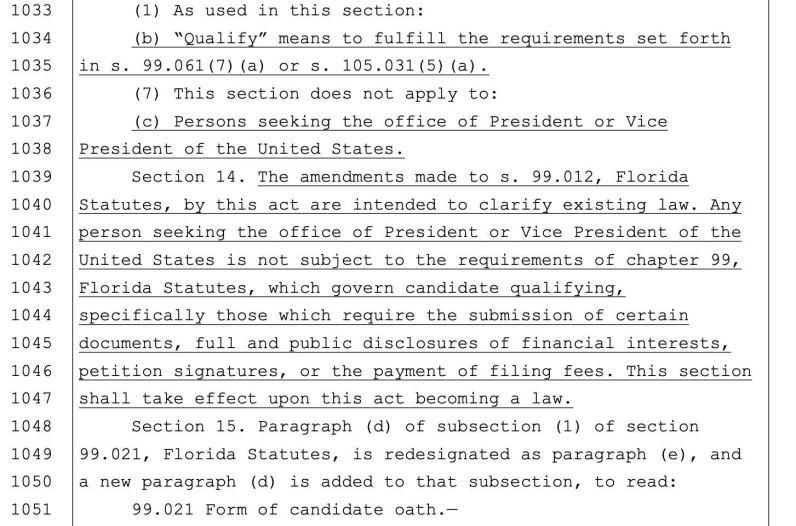Florida Lawmaker Introduces Amendment to Allow DeSantis to Run for President without Resigning

- Oops!Something went wrong.Please try again later.
- Oops!Something went wrong.Please try again later.
Ron DeSantis could run for president without resigning his post as governor of Florida, according to an election bill amendment filed Tuesday by a Republican state senator.
The amendment to the elections bill, SB7050, would clarify qualification requirements for political offices and exempt “Persons seeking the office of President or Vice President of the United States” from state rules that require political office holders to resign their current position in order to qualify as a candidate for another office.
The strike-all amendment was filed Tuesday afternoon by state Senator Travis Hutson, a Republican from northeast Florida, whom DeSantis endorsed last year.

Florida law currently states that “No officer may qualify as a candidate for another state, district, county, or municipal public office if the terms or any part thereof run concurrently with each other without resigning from the office he or she presently holds.”
The office holder’s “resignation is irrevocable,” the law states, and it “must be submitted at least 10 days prior to the first day of qualifying for the office he or she intends to seek.”
The Florida House is expected to file its own version of the amendment later this week.
Republican leaders have expressed openness to amending the resign-to-run law since DeSantis won a landslide re-election victory in November. While he has not officially declared his candidacy, DeSantis is seen by many as the top Republican challenger to former president Donald Trump for the GOP presidential nomination.
DeSantis is expected to formally announce his candidacy after the 2023 legislative session wraps up early next month. In the meantime, Trump has been racking up endorsements from the state’s congressional delegation.
After the November election, state House Speaker Paul Renner and state Senate President Kathleen Passidomo, who both preside over Republican supermajorities, said they were on board with changing and clarifying the law.
“If an individual who is Florida governor is running for president, I think he should be allowed to do it,” Passidomo told reporters, according to Politico. “That’s a big honor and a privilege, so it is a good idea.”
Passidomo has also questioned if the law needs to be changed at all.
“In my view, it is already apparent that resign-to-run does not apply to presidential and vice presidential candidates,” Passidomo said in a prepared statement, according to the Florida Politics website. “Under our law, the timeline for resigning is entirely based on qualifying. Presidential and vice presidential candidates do not have to qualify. Presidential and vice presidential nominees (other than write-in candidates) are decided by their respective political parties at national conventions. Currently, they do not have to complete a candidate’s oath, pay a qualifying fee, fill out a financial disclosure, or turn in any of the other qualifying documentation and paperwork required of candidates for other offices.”
Renner he doesn’t believe DeSantis would have to resign to run for president, even as the law currently stands. “We look forward to receiving the Senate’s proposed amendment to codify and clarify in plain language how legal scholars already interpret the law: a Florida office holder does not need to resign to run for President or Vice President,” he said in a text.
Florida lawmakers have changed the law in the past. In 2008, lawmakers changed it so then-governor Charlie Crist – a Republican at the time – could be considered as a running mate for then-GOP nominee John McCain. Lawmakers reinstated the resign-to-run law in 2018.
A carve-out for an office holder whose term was about to end allowed then-governor Rick Scott to run for his U.S. Senate seat in 2018. That carve-out doesn’t apply to DeSantis, whose term as governor runs into January 2027.
Last month, Trump allies filed an ethics complaint accusing DeSantis of illegally soliciting and receiving millions of dollars in gifts as part of a “shadow presidential campaign.” DeSantis’s office called the complaint “frivolous” and “politically motivated.”
Editor’s Note: This story has been updated to include a statement from Florida House Speaker Paul Renner.

